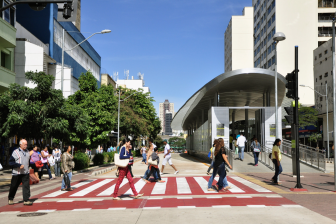
UNICEF chief visits Brazilian cities to highlight child poverty
The head of UNICEF, Catherine Russell, has visited three Brazilian cities to highlight the plight of children in poverty and the risks to them posed by climate change and the environment.
More than half of Brazil’s children are living in poverty, and many of these live in the cities of Sao Paulo, Recife and Brasilia, all of which she saw for herself over the four-day visit.
In meetings with national government and community leaders, as well as representatives from the private sector, Ms Russell reiterated UNICEF’s support for the country’s efforts to improve the health and well-being of the 32 million children affected by poverty.
One of the consequences for children of living in poverty, says UNICEF, is that they are often cut off from essential services like health, education, basic sanitation and protection. Climate change is another enormous issue, with some 40 million children across the country – which has a population of some 214 million – deemed ‘vulnerable’ to climate or environmental risks.
’32 million children affected by poverty’
“Brazil is working hard to accelerate progress in all areas of children’s health, education and safety (and) can serve as an important role model to put the rights of children at the heart of the Sustainable Development Goals,” said Ms Russell.
In a few weeks’ time the United Nations Sustainable Development Goals Summit will be taking place in New York, where countries will be assessing their progress at the halfway point to achieving the 2030 Development Goals, a radical 17-point plan to drastically improve the lives of people – with children at the forefront – and the planet by 2030.
Yet Brazil, like many other countries, has seen its progress on some these goals slow down as a result of multiple factors, including the suffered the impacts of the COVID-19 pandemic, climate change and global inflation.
Her visit to what are three of Brazil’s largest cities included discussions with the private sector and youth in São Paulo, government officials and civil society in Brasilia, and vulnerable communities in the coastal city of Recife, one of the most at-risk cities in the world related to climate change.
“The children of Brazil face many difficulties, including the impact of climate change, poverty, and lack of access to essential services,” said Russell, “It was inspiring to hear the views and aspirations of young people. It is essential to engage all children in finding solutions to these key challenges.”
Click here for more on UNICEF’s Sustainable Development Goals.




